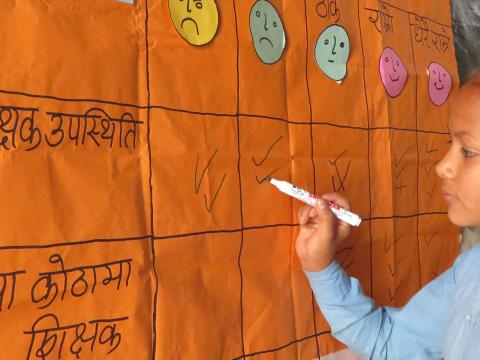Making the dream of quality education a reality

Children from vulnerable and poor families are not generally expected to raise voice for public interest. That is rare in rural Nepali communities and it is exactly what is happening today at Bhanubhakta National Lower Secondary School in Kailali District.
Monika, a student of grade six, and a sponsored child supported by World Vision, is evaluating the standard of services provided at her school.
Today, Monika and her friends along with parents and community members have gathered at her school. They have gathered here to evaluate the services at their school and identify the areas of improvement so that the school can better ensure quality education. They are having these conversations separately in their respective groups based on the policy standards set by the Government of Nepal. This includes teachers' availability, physical infrastructure, text book availability, separate toilets, supplementary reading materials and other contextual issues.
Monika and her group have further added two agendas relating to the provision of extra- curricular activities and a library. They are evaluating these facilities by putting a tick mark under ratings of good or bad status on the flip chart. After the discussion, Monika leads her group and presents the summary of the evaluation in a confident, bold tone. She then gets ready to present this with the wider group of parents, teachers, and school management team in the interface meeting.
In Nepal, there is often a gap between public service delivery and policy standards. Due to this, people do not receive the quality service which they are entitled to. At which point, social accountability is compromised. Decision making bodies and service providers do not tend to have dialogues on improving the services. Community members do not think that they are entitled to have such dialogues with service providers and government authorities.
In order to strengthen social accountability at the community level, World Vision has introduced Citizen Voice and Action (CVA) as a local level advocacy and social accountability approach. Under CVA, community people and children are first empowered and made aware on public policies. With this empowerment, local services are evaluated and a way forward is identified for further improvement.
The role played by Monika is a part of the CVA process in Bhanubhakta School. During the three- hour discussion, the interface meeting has resulted to an action plan where the voice of Monika and her team has been addressed. "We will approach the local government bodies and representatives to ensure budget for this," says Maya Saud, the school principal.
Intending to have a constructive dialogue for improving services, World Vision has been empowering citizens and children on education service standards. WV Nepal emphasises on empowering children like Monika to enable them to raise their voice and concerns in the communities. The role of Monika is motivating for her friends and other children to make the school management team accountable for quality education services. World Vision had introduced CVA in 18 schools in Kailali in 2016/17 and it has targeted 15 more schools for another new CVA cycle from 2018.
“I'm happy that I'm able to raise voice and bring my concerns in front of other people. I feel proud that they have incorporated my issues in the action plan," says Monika, with a smile.
We dream of a better tomorrow where vulnerable children and their families are educated, empowered and provided with the opportunity to raise their voice for their rights.
Written by Sunil Hakaju Shrestha, Advocacy Specialist




